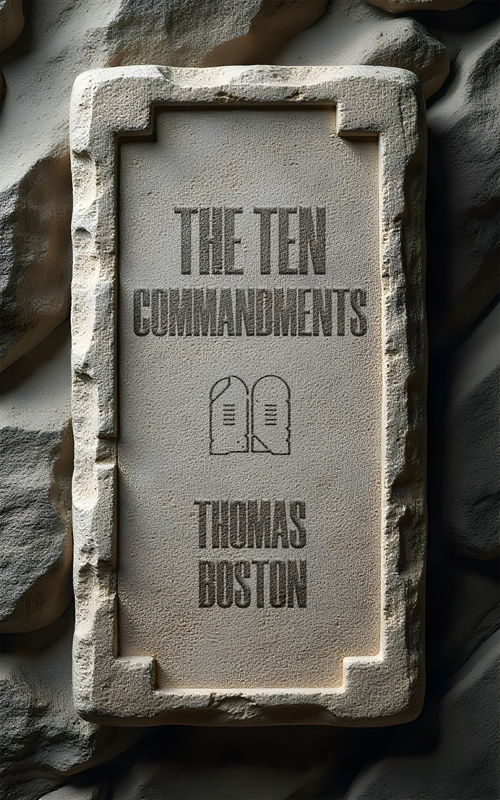 by Thomas Boston
by Thomas Boston
in ePub, .mobi & .pdf formats
I am the Lord thy God, which have brought thee out of the land of Egypt, out of the house of bondage. - EXOD. 20:2
SOME take these words, which are the first of that speech spoken immediately by God himself, to be a part of the first commandment, shewing who is the true God, that is to be our God. Our Catechism determines them to be a preface to all the commandments; and though they have a particular relation to the first command, 'Thou shalt have no other gods before me,' viz. The Lord thy God, which have brought thee out of the land of Egypt, out of the house of bondage; yet, seeing the first commandment has a common relation to all of them, and is interwoven with all the rest, and the words natively enforce obedience to the whole, they are set here as a preface to all the commands, like a magnificent entry into a palace, decorated with the arms of the owner. In the words consider,
1. The Speaker and Giver of these commandments. It is the Lord, particularly Jesus Christ, who gave this law in the name of the Trinity. This is plain from the scripture, Acts 7:38. Heb. 12:24–26. It was he that brought the people out of Egypt, and that appeared in the bush that burned with fire, and yet was not consumed, giving commission to Moses for their deliverance, Exod. 3:2–8.
2. The speech itself, wherein we have a description of the true God, bearing three reasons for the keeping his commands. (1.) From his sovereignty; he is the Lord. (2.) From his covenant-relation to his people, thy God. (3.) From the great benefit of redemption, and deliverance wrought for them.
DOCT. 'The preface to the ten commandments teacheth us, That because God is the Lord, and our God, and Redeemer, therefore we are bound to keep all his commandments.'
But it may be asked, Why does the Lord make use of arguments to induce us to obedience? Ans. Because he loves to work on man, as a rational creature, according to the principles of his nature. Hence he says, Hos. 11:4. 'I drew them with the cords of a man, with bands of love;' and because he delights in no obedience but what is unconstrained and cheerful. It is truly matter of wonder, that the infinitely glorious God should be at so great pains to incline man to pursue his own happiness.
Here I shall consider the several reasons of obedience mentioned in the text and doctrine, and then draw some inferences for application.
-----
Table of Contents
OF THE DUTY WHICH GOD REQUIRETH OF MAN
THE MORAL LAW, THE RULE OF MAN'S OBEDIENCE
THE MORAL LAW SUMMARILY COMPREHENDED IN THE TEN COMMANDMENTS
LOVE TO GOD AND OUR NEIGHBOUR, THE SUM OF THE TEN COMMANDMENTS
THE PREFACE TO THE TEN COMMANDMENTS
OF THE FIRST COMMANDMENT
OF THE SECOND COMMANDMENT
OF THE THIRD COMMANDMENT
OF THE FOURTH COMMANDMENT
OF THE FIFTH COMMANDMENT
THE DUTY OF RULING ELDERS AND PEOPLE
OF THE SIXTH COMMANDMENT
OF THE SEVENTH COMMANDMENT
OF THE EIGHTH COMMANDMENT
OF THE NINTH COMMANDMENT
OF THE TENTH COMMANDMENT
OF MAN'S INABILITY TO KEEP THE LAW PERFECTLY
OF SIN IN ITS AGGRAVATIONS
OF THE DESERT OF SIN
